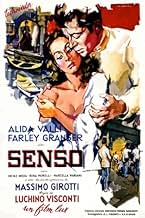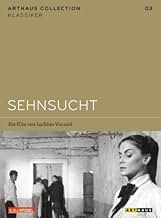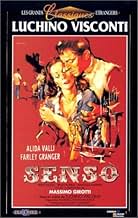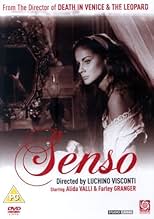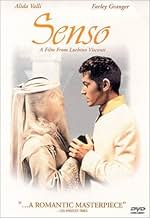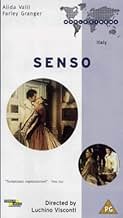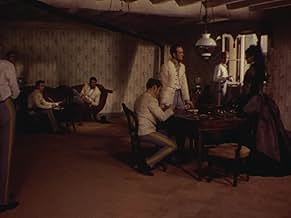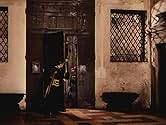Senso
- 1954
- Tous publics
- 2h 3m
IMDb RATING
7.4/10
9.4K
YOUR RATING
An Italian Countess is allied with Nationalists during the Italian-Austrian war of unification. However, she risks betraying their cause when she falls in love with an Austrian lieutenant.An Italian Countess is allied with Nationalists during the Italian-Austrian war of unification. However, she risks betraying their cause when she falls in love with an Austrian lieutenant.An Italian Countess is allied with Nationalists during the Italian-Austrian war of unification. However, she risks betraying their cause when she falls in love with an Austrian lieutenant.
- Awards
- 3 wins & 2 nominations total
Franco Arcalli
- Un soldato
- (uncredited)
Aldo Bajocchi
- Un soldato
- (uncredited)
Ottone Candiani
- Un soldato
- (uncredited)
Nando Cicero
- Un soldato
- (uncredited)
Claudio Coppetti
- Un soldato
- (uncredited)
Cristoforo De Hartungen
- Il generale Hauptmann
- (uncredited)
Tony Di Mitri
- Un soldato
- (uncredited)
Featured reviews
Senso was Visconti at his most elegant and aesthetic. It opened his series of historical spectacles. The film showed that epics and melodramas can entail political criticism as any other genres. Senso is his intelligent analysis about the Italian unification - Risorgimento. The film's criticism didn't please all the people and it suffered from censorship and it was edited several times. Nonetheless this aesthetically beautiful film still stands out as a fine ironic masterpiece.
The year is 1866 and the moment people have dreamed for decades - centuries - is in our hands. Garibaldi is coming and the Italians are beating the Austrians. In the middle of all this Visconti tells us a story about an Italian woman, who is the cousin of the leader of the underground resistance, who falls in love with an Austrian lieutenant. She is blinded by her romantic illusion and is ready to betray her family, friends, ideals and native land - these are part of the ethical problematics in Senso.
Senso was Visconti's first color film and he obviously had put a lot of effort to it. It's visually gorgeous and meant an aesthetic revolution for Italian cinema. It is no coincidence that it starts in an opera which Visconti did a lot himself too. The opening sequence shows us the basic power of Opera and melodrama - to change life, infrastructure without forgetting the concrete history.
Historical films always tell us about two different ages, intentionally or unintentionally: the one the story takes place in and the time it was made in. It's a film about the Italian unification but also a study about the deepest emotions in Italy during the 1950's. Italy after WWII, filled with neo realism - antifascist battle and hope for democracy. But also about the downside; the victory of the right-wingers and the beginning of the Cold War.
Senso is a gorgeous film which requires patience and love from its viewer. It's a political, ironic, revolutionary and aesthetic film. Truly one of the biggest landmarks in Visconti's career but also in the history of Italian cinema.
The year is 1866 and the moment people have dreamed for decades - centuries - is in our hands. Garibaldi is coming and the Italians are beating the Austrians. In the middle of all this Visconti tells us a story about an Italian woman, who is the cousin of the leader of the underground resistance, who falls in love with an Austrian lieutenant. She is blinded by her romantic illusion and is ready to betray her family, friends, ideals and native land - these are part of the ethical problematics in Senso.
Senso was Visconti's first color film and he obviously had put a lot of effort to it. It's visually gorgeous and meant an aesthetic revolution for Italian cinema. It is no coincidence that it starts in an opera which Visconti did a lot himself too. The opening sequence shows us the basic power of Opera and melodrama - to change life, infrastructure without forgetting the concrete history.
Historical films always tell us about two different ages, intentionally or unintentionally: the one the story takes place in and the time it was made in. It's a film about the Italian unification but also a study about the deepest emotions in Italy during the 1950's. Italy after WWII, filled with neo realism - antifascist battle and hope for democracy. But also about the downside; the victory of the right-wingers and the beginning of the Cold War.
Senso is a gorgeous film which requires patience and love from its viewer. It's a political, ironic, revolutionary and aesthetic film. Truly one of the biggest landmarks in Visconti's career but also in the history of Italian cinema.
It's no coincidence that the film opens at the opera. In some fine deep shots we are introduced to our characters with the performance in the background - no doubt to establish the stylistic connection. So Visconti, and collaborator Franco Zefferelli, wanted to make an opera without the singing. This gives us grandeur, but rigidity, and even the mini riot that takes place in the opera house at the outset is aesthetically stylised. You need to buy into the approach at this point, and I simply didn't. It just seemed like a bad idea. Opera is a stage spectacle, all about grand gesture, posturing, formality; it cannot transmit subtleties, the format doesn't allow it. Take away the music and you are left with a banal story and a lot of fancy costumery. For Visconti, constantly wanting to remind us of his noble descent, that is enough - his main concern is showing us lavish interior decor, an obsession you'll find either stirring or stifling. For music we get Bruckner, whose indecisive, meandering drone is largely ignorable.
Cinematically, the result is half-baked. Valli walks into a room full of Austrian soldiers. David Lean (who I equate with Visconti to some extent) would have made a significant scene out of this but Visconti just gives us soldiers draped around the place in various unnatural postures, as you might expect. One of them moves and strikes up a different posture as you might expect. It's all cut and pasted from the Manual of Things Seen and Done Before. The camera stays back, wide angle, and doesn't lend much of a hand with the narrative, leaving the players to communicate with exaggerated gesture.
A married Venetian countess falls for a young Austrian army officer - we know from the first scene that he is an utter cad, but she doesn't or rather she does, but being a one dimensional clinging woman she is bound to hurl herself into disastrous folly. Hence the film mainly consists of Valli ringing the emotional changes over her illicit affair. Visconti indulged so much time in this that he must have thought he was dealing with an original topic. Along the way, there's the approaching end of Austrian rule of northern Italy and some slight comment on the collaboration of senior Venetian figures but that point seems hardly worth making after all this time. There is a lengthy section where Valli's cousin (dashing hero figure) rushes on a military errand rather ridiculously right across the battle line of two approaching armies, but this section was apparently heavily edited, rendering it pointless and incomprehensible. The battle scenes are childish a puff of smoke and the nearest two soldiers fall to the ground this happens repeatedly.
The script can't do anything with the stereotypical characters and the one-sentence plot and there are no stand-out lines. This is extraordinary considering the 'English dialogue by Tennessee Williams and Paul Bowles'. Probably it was there but smothered by Visconti's operatic technique. One wonders why these writers were attracted to the project (apart from a free holiday in Rome) perhaps they liked the final humiliation of the countess, which is quite harsh even gleefully misogynistic. She gets her own back though, and it seems the moral is that both men and woman, with their impulsive need for each other, no matter how noble the exterior, are stupid, weak and mutually self-destructive. That ridicules everybody (...or does it?).
Funnily enough, the main problem is Alida Valli, who is required to over-emote in every scene (in total contrast to her depressive role in "The Third Man") it's a little unpleasant to watch and she soon begins to annoy. She doesn't look right at all during the romance too hard-edged. Farley Granger was actually the main point of interest. His slight woodenness suits the impossibly white uniform and cape he was made to wear (what sort of wash-powder did they have in those days?), and in the climactic drunken scene (enhanced by a delightful whore - the highlight of the film) he did as well as anyone could have done under a direction that demanded over-amplification of every attempted nuance. And his eyes expressed something beyond the paltry plot of the film as if betraying that this Italian job was an odd, intense experience for him for one reason or another. So, for all the film's grandeur, all I was left with was some vague speculation of a personal nature about one of its players. Perhaps his story relating to the real world - is the film Visconti should have made.
Cinematically, the result is half-baked. Valli walks into a room full of Austrian soldiers. David Lean (who I equate with Visconti to some extent) would have made a significant scene out of this but Visconti just gives us soldiers draped around the place in various unnatural postures, as you might expect. One of them moves and strikes up a different posture as you might expect. It's all cut and pasted from the Manual of Things Seen and Done Before. The camera stays back, wide angle, and doesn't lend much of a hand with the narrative, leaving the players to communicate with exaggerated gesture.
A married Venetian countess falls for a young Austrian army officer - we know from the first scene that he is an utter cad, but she doesn't or rather she does, but being a one dimensional clinging woman she is bound to hurl herself into disastrous folly. Hence the film mainly consists of Valli ringing the emotional changes over her illicit affair. Visconti indulged so much time in this that he must have thought he was dealing with an original topic. Along the way, there's the approaching end of Austrian rule of northern Italy and some slight comment on the collaboration of senior Venetian figures but that point seems hardly worth making after all this time. There is a lengthy section where Valli's cousin (dashing hero figure) rushes on a military errand rather ridiculously right across the battle line of two approaching armies, but this section was apparently heavily edited, rendering it pointless and incomprehensible. The battle scenes are childish a puff of smoke and the nearest two soldiers fall to the ground this happens repeatedly.
The script can't do anything with the stereotypical characters and the one-sentence plot and there are no stand-out lines. This is extraordinary considering the 'English dialogue by Tennessee Williams and Paul Bowles'. Probably it was there but smothered by Visconti's operatic technique. One wonders why these writers were attracted to the project (apart from a free holiday in Rome) perhaps they liked the final humiliation of the countess, which is quite harsh even gleefully misogynistic. She gets her own back though, and it seems the moral is that both men and woman, with their impulsive need for each other, no matter how noble the exterior, are stupid, weak and mutually self-destructive. That ridicules everybody (...or does it?).
Funnily enough, the main problem is Alida Valli, who is required to over-emote in every scene (in total contrast to her depressive role in "The Third Man") it's a little unpleasant to watch and she soon begins to annoy. She doesn't look right at all during the romance too hard-edged. Farley Granger was actually the main point of interest. His slight woodenness suits the impossibly white uniform and cape he was made to wear (what sort of wash-powder did they have in those days?), and in the climactic drunken scene (enhanced by a delightful whore - the highlight of the film) he did as well as anyone could have done under a direction that demanded over-amplification of every attempted nuance. And his eyes expressed something beyond the paltry plot of the film as if betraying that this Italian job was an odd, intense experience for him for one reason or another. So, for all the film's grandeur, all I was left with was some vague speculation of a personal nature about one of its players. Perhaps his story relating to the real world - is the film Visconti should have made.
Italy is still probably in ruins of war at this point, real or figurative, so what does this filmmaker do, Visconti? By waving his wand, he conjures up an earlier Italy, also in the throes of occupation and war, it's the last days of the Austrian occupation around Venice, but now it can all be placed in the safer distance of history, set up as operatic melodrama on a stage.
You'll see this self-referential waving of the hand in the just the opening scene. We open in an opera house in the middle of a play, with actors on stage valiantly rushing to weapons. As soon as the play is over, patriot viewers rain the place down with revolutionary pamphlets.
It is an operatic play that we see; film as opera. Up on this stage, collaboration with a regime can be safely contained in a love affair, rich countess falling for the dashing Austrian lieutenant. In the usual melodramatic passion, she risks all. The whole point of the story is to have moments like when news reach her of a battle won against the Austrians, but instead of rejoicing at liberation, she must look terrified because her beau might have been on that battlefield.
It's not something I can get excited about, nor would I recommend you go out of your way to find it, except as contrast to other, more pertinent things about how a viewer can be choreographed through space. I mean, here is a cinema of vistas and gestures. When a camera pans around a room that someone walks in, it's just this room that we see. War is suddenly introduced as a series of vistas with crowds rushing about, filmed in a disjointed way in order to convey chaos and mobilization and yet they manage to look placid and painterly.
But how about this? It ends with another self-referential note but now one that waves away illusion, dispels fiction. Having risked all, she finds out he's not the dashing hero of operas that she wanted him to be.
Up on this stage, turning your back on your countrymen is only the innocent fallout of passion, all because you maybe yearned for some of the romance of stories from the past.
You'll see this self-referential waving of the hand in the just the opening scene. We open in an opera house in the middle of a play, with actors on stage valiantly rushing to weapons. As soon as the play is over, patriot viewers rain the place down with revolutionary pamphlets.
It is an operatic play that we see; film as opera. Up on this stage, collaboration with a regime can be safely contained in a love affair, rich countess falling for the dashing Austrian lieutenant. In the usual melodramatic passion, she risks all. The whole point of the story is to have moments like when news reach her of a battle won against the Austrians, but instead of rejoicing at liberation, she must look terrified because her beau might have been on that battlefield.
It's not something I can get excited about, nor would I recommend you go out of your way to find it, except as contrast to other, more pertinent things about how a viewer can be choreographed through space. I mean, here is a cinema of vistas and gestures. When a camera pans around a room that someone walks in, it's just this room that we see. War is suddenly introduced as a series of vistas with crowds rushing about, filmed in a disjointed way in order to convey chaos and mobilization and yet they manage to look placid and painterly.
But how about this? It ends with another self-referential note but now one that waves away illusion, dispels fiction. Having risked all, she finds out he's not the dashing hero of operas that she wanted him to be.
Up on this stage, turning your back on your countrymen is only the innocent fallout of passion, all because you maybe yearned for some of the romance of stories from the past.
I have rated this film 9 because of it's length, there are some ponderous moments, but otherwise it is a 10. Italian cinema was still having growing pains from the war, but this epic succeeds, and skillfully incorporates the war torn landscape into this tale of an earlier war. The music score is very big and melodramatic, but fitting. The film opens with an opera in an enormous opera house, and this is fitting for the grand scale and operatic scope of this romance and the background. This is "Gone With the Wind" - Italian style - with a much more sympathetic heroine.
I am a fan of Alida Valli and have sought out her work. Perhaps because this is in her native Italian, and/or because of her Italian director, she is a full, vital, feminine woman in this film; very different from her more restrained work in America. (Her breathtaking performance in "The Paradine Case" is a study in austerity and an almost masculine stillness.) I had hoped that we would see a more free actress in her native language, and we do! She flutters and tosses her hair, she is a Countess reveling in her earthy affair. This is a full bodied performance.
Farley Granger's performance, whether in response to Valli, or just given a really meaty bad-boy to play, is a total revelation. He is lusty and sexy, provocative, pouty and passionate. In one scene, he greets her by wordlessly grabbing her hand and almost devouring it with kisses. This is a rare film where both the woman AND the man have real powerhouse roles. The confrontation scene at the end is gripping.
A small but pivotal role is played by Marcella Mariani. Her cow-like leadenness, laced with sisterhood, bespeaks a worldliness that, paired with her ethereal youthful beauty is just wrenching. All supporting roles, especially the maids, are interesting and give a sense of intrigue throughout.
A previous reviewer mentioned that the outcome of a major plot point is cut out, which leaves you wondering... "but what happened with that?" Still, the major story is the romance, which I think will be satisfying for men as well as women, because both sides are given such full emotional life. IF YOU CAN FIND IT, it is an enjoyable, big emotion, epic wartime romance.
I am a fan of Alida Valli and have sought out her work. Perhaps because this is in her native Italian, and/or because of her Italian director, she is a full, vital, feminine woman in this film; very different from her more restrained work in America. (Her breathtaking performance in "The Paradine Case" is a study in austerity and an almost masculine stillness.) I had hoped that we would see a more free actress in her native language, and we do! She flutters and tosses her hair, she is a Countess reveling in her earthy affair. This is a full bodied performance.
Farley Granger's performance, whether in response to Valli, or just given a really meaty bad-boy to play, is a total revelation. He is lusty and sexy, provocative, pouty and passionate. In one scene, he greets her by wordlessly grabbing her hand and almost devouring it with kisses. This is a rare film where both the woman AND the man have real powerhouse roles. The confrontation scene at the end is gripping.
A small but pivotal role is played by Marcella Mariani. Her cow-like leadenness, laced with sisterhood, bespeaks a worldliness that, paired with her ethereal youthful beauty is just wrenching. All supporting roles, especially the maids, are interesting and give a sense of intrigue throughout.
A previous reviewer mentioned that the outcome of a major plot point is cut out, which leaves you wondering... "but what happened with that?" Still, the major story is the romance, which I think will be satisfying for men as well as women, because both sides are given such full emotional life. IF YOU CAN FIND IT, it is an enjoyable, big emotion, epic wartime romance.
Italian historical melodrama, from Lux Film and director Luchino Visconti is set in Venice in 1866. The Austrian army has occupied the city-state, and will not allow it to unite with Italy. A small but increasingly vocal faction of Venetian revolutionaries are working toward rebellion, aided by the Prussians. It is with this background the main story unfolds, as Venetian countess Livia (Alida Valli), unhappily married to the much older Count (Heinz Moog), begins an affair with arrogant young Austrian officer Franz Mahler (Farley Granger). Mahler is using Livia as a diversion and for her money, but she becomes more and more obsessed with him, even as full-blown war erupts around them.
This torrid romantic melodrama is best appreciated for Visconti's painterly compositions, the excellent location cinematography, and the detailed costumes and set design. The story itself is merely adequate, and the performances are uneven. Valli has some great moments, but in others she's asked to play it too wild-eyed and big. Granger is sneering and self-satisfied, but he loses it a bit in his big breakdown scene near the end. Visconti edited an English-language version which was re-titled The Wanton Countess and ran 30 minutes shorter. That version's English dialogue was written by Tennessee Williams and Paul Bowles. Among Visconti's assistants on this film were future directors Francesco Rosi and Franco Zeffirelli. This is one of the 1001 Movies You Must See Before You Die.
This torrid romantic melodrama is best appreciated for Visconti's painterly compositions, the excellent location cinematography, and the detailed costumes and set design. The story itself is merely adequate, and the performances are uneven. Valli has some great moments, but in others she's asked to play it too wild-eyed and big. Granger is sneering and self-satisfied, but he loses it a bit in his big breakdown scene near the end. Visconti edited an English-language version which was re-titled The Wanton Countess and ran 30 minutes shorter. That version's English dialogue was written by Tennessee Williams and Paul Bowles. Among Visconti's assistants on this film were future directors Francesco Rosi and Franco Zeffirelli. This is one of the 1001 Movies You Must See Before You Die.
Did you know
- TriviaThe film opens in La Fenice, the Venice opera house. La Fenice was destroyed by arson in 1996, but reopened in 2003. Enlarged frames of this movie were used as a reference in reconstructing it.
- Quotes
Il tenente Franz Mahler: It's too late! It's over! I'm not your romantic hero!
- Alternate versionsTwo versions of the film are available on video.
- One version is missing the scene where Livia tries to explain where all the money meant for the troops went.
- Another version is missing the climatic battle sequence between the Austrian and Italian troops.
- ConnectionsEdited into Histoire(s) du cinéma: La monnaie de l'absolu (1999)
- SoundtracksSinfonia N. 7 in mi maggiore (7th Symphony)
Music by Anton Bruckner
Performed by Orchestra Sinfonica Nazionale della Rai
Conducted by Franco Ferrara
- How long is Senso?Powered by Alexa
Details
- Release date
- Country of origin
- Languages
- Also known as
- The Wanton Contessa
- Filming locations
- Teatro La Fenice, Venice, Veneto, Italy(opening scenes)
- Production company
- See more company credits at IMDbPro
Box office
- Budget
- ITL 700,000,000 (estimated)
- Gross US & Canada
- $27,723
- Opening weekend US & Canada
- $3,984
- Oct 28, 2018
- Gross worldwide
- $27,723
- Runtime2 hours 3 minutes
- Color
Contribute to this page
Suggest an edit or add missing content

![Watch Trailer originale italiano [OV]](https://m.media-amazon.com/images/M/MV5BYzc0Y2MyOGMtMzg0My00Mzc4LWIwYjItZjg1ZDhmMDZmOTlkXkEyXkFqcGdeQXRodW1ibmFpbC1pbml0aWFsaXplcg@@._V1_QL75_UX500_CR0)

